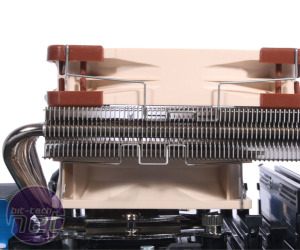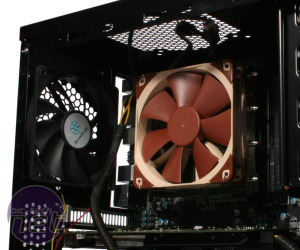
Performance Analysis
With both fans running without the LNA cables, the NH-L12 achieved a load delta T of 45°C, which is an excellent result for a cooler of its dimensions. It places it ahead of the much larger Thermolab Trinity (though this cooler is excellent at cooling AMD rigs), and only a few degrees Celcius behind tower coolers like the Gelid GX-7 and Be Quiet! Dark Rock Advanced. Its noise output was also wonderfully low, and it was very difficult to hear in testing. Even better, implementing the LNA cables saw the delta T rise by only 2°C, and the noise fell to a level that made it impossible to hear over the rest of our test system.Removing the 120mm fan for extra-low profile mode did increase the load delta T to 53°C (54°C with the LNA cable in place), but this is still a significantly better result than both the other low-profile coolers we've tested in this system. With just one fan, the LNA cable was essentially redundant, as the sound produced either way was practically silent. The setup that strikes the best balance between sound and performance is dual-fan mode with the LNA cables used, but in extra-low profile mode it's unnecessary to use the RPM reducing wire.


Click to enlarge - The cooler fitted without clearance issues onto our motherboard (left) and with plenty of room to spare in our case (right)
Conclusion
The Phanteks PH-TC90LS and the Arctic Freezer 11 LP are both excellent choices as cheap and capable replacements for the Intel reference cooler, but do begin to struggle and make some noise in an overclocked performance rig. The Noctua NH-L12 may be slightly larger than these coolers, but in extra-low profile mode it should still be a comfortable fit for many a mini-ITX build. Not only this, but in this mode it can tame an overclocked i7-2600K in a low airflow test chassis rather respectably.Its performance in dual fan mode is very good, keeping temperatures low and noise to a tiny whisper, and in this configuration it will still squeeze into a fair few mini-ITX cases. However, it is on the expensive side, and if you have the space for a bigger cooler, many cheaper ones that do a better job than the NH-L12 are available and should be your first choice. However, the ability to build a tiny but very powerful computer is now an easy reality and LGA1155 chips are likely contenders for such builds. Therefore, while it doesn't receive a universal recommendation, the NH-L12 would make a solid purchase for those looking to squeeze the most from a mini-ITX rig.
LGA1155 Score
-
Value24 / 30
-
Design27 / 30
-
Cooling28 / 40


MSI MPG Velox 100R Chassis Review
October 14 2021 | 15:04








Want to comment? Please log in.